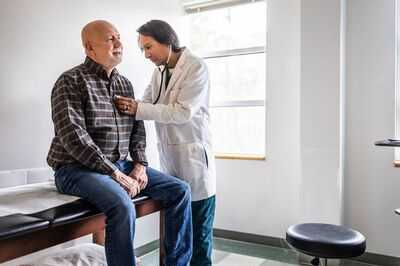Prostate canceris one of the most prevalent types of cancers in the UK and will affect around one in 8 men throughout their lifetime, according to data from Prostate Cancer UK. Overall, it accounts for 14% of all new cancers in the UK with around 55,300 new cases recorded each year.
Furthermore, data from Cancer Research UK highlights that there are around 12,200 deaths from prostate cancerin the UK each year, or 33 every day. The prostate is a small gland placed just under the bladder and tends to develop cancer when its cells begin growing uncontrollably.
However, depending on the severity of the cancer, it may not always need immediate treatment. This will depend entirely on how the cancer is behaving and how far it has progressed.
- Amanda Holden fumes 'this is an outrage' after attack at home leaves her injured
- Tesco shoppers running for Christmas treat as it's half price for limited time
 Symptoms of prostate cancer
Symptoms of prostate cancer According to guidance from the NHS, people suffering from prostate cancer will often have no symptoms at first. However, once the cancer begins to grown and spread on the outer part of the prostate it can cause a number of common symptoms, especially affecting the way you go to the toilet.
This can include:
- "Stop start" peeing
- Peeing during the night
- Needing to pee urgently or often, or both
- Feeling like you still need to pee when you've just finished
- Having a weak flow of urine
- Finding it difficult to start peeing or straining to pee
- Erectile dysfunction
- Lower back pain
- Losing weight without trying to
- Blood in your urine
- Blood in your semen
In many cases, prostate cancer can go undetected due to a lack of symptoms in the early stages. Therefore, it's advised to understand that different types of people could be at a higher risk of prostate cancer than others.

This can include men over the age of 50 and those with a family history of prostate cancer.
When to see your GPGuidance from the NHS highlights that if you're over 50, have a history of prostate cancer in teh family, come from a black ethnic background, or are concerned about your risk of prostate cancer, then you should see a GP. It is also advised to see a GP if you're suffering from any symptoms that could be related to prostate cancer.
Typically, a GP will have a discussion about your health and potential prostate cancer risk with you. They may also choose to perform a rectal examination to look for signs of cancer.
In some cases, you could also be referred to a specialist to undergo further tests.
You may also like

Search Operations launched after Pakistan drones sighted along border in J-K's Samba

Women's tennis awaits its Sin-Caraz

Ronnie O'Sullivan makes huge Luke Littler prediction amid No.1 bid

Wearing popular Halloween costume may lead to imprisonment and unlimited fine

Aryna Sabalenka speaks out after nearly getting disqualified at Wuhan Open







